CEO MESSAGE
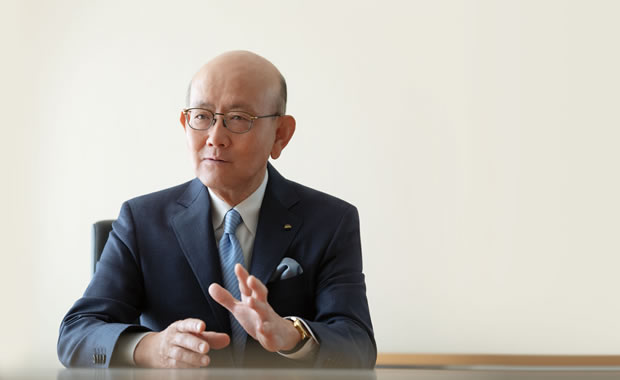
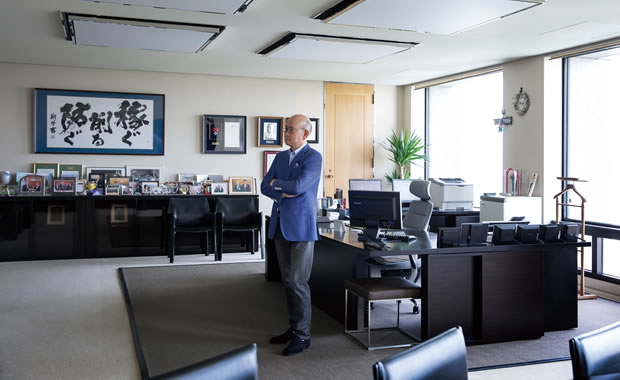
ITOCHU responds boldly to change.
Our corporate culture of staying ahead and taking on challenges will come into its own as we evolve into a “next-generation merchant.”
FYE 2018 marked our second consecutive year of posting record-high consolidated net profit.
We also met the goal we had committed to under “Brand-new Deal 2017,” our medium-term management plan: “build solid earnings base to generate ¥400.0 billion consolidated net profit.”
In FYE 2019, the 160th anniversary of our founding, we are launching a new medium-term management plan, “Brand-new Deal 2020.”
Under this plan, the ITOCHU Group will pull together as it takes on altogether new challenges.
Moving toward our vision as a “next-generation merchant,” we will keep evolving in line with the “earn, cut, prevent” principles that are the hallmark of our business.
(→"Brand-new Deal 2017"(FYE 2016-2018) General Review)![]() (→New Medium-Term Management Plan)
(→New Medium-Term Management Plan)![]()
Masahiro Okafuji
Chairman & Chief Executive Officer
Rereading My Policy Speech
One day in April 2010, my legs seemed heavy as I trudged from Osaka to Tokyo. Earlier, on February 11, 2010, I was told to take over the reins from President Kobayashi for the next term of office. I still recall that day vividly. A cold rain was falling as I contemplated the weighty responsibility of taking the helm of a company with more than 150 years of history and the responsibility for supporting the families of more than 60,000 employees on a consolidated basis. Until that point, most of the Company’s presidents had hailed from Corporate Planning in the Tokyo head office. It had been 36 years since someone from the Textile Company had been appointed to the office. I suppose one reason my legs felt heavy was because I felt I was coming from a tributary business—a Division Company headquartered in Osaka, far away from Tokyo, and one that had shrunk in scale.
The first few years were lonely, as I racked my brains to work out a future vision for the Company and figure out how to get there. The goal I came up with was to become a company that can stand shoulder to shoulder with the top general trading companies (sogo shosha) that hail from Japan’s large zaibatsu industrial groups. This goal was easier to express than achieve, of course, and few people shared my enthusiasm. After all, at the time we were solidly in fourth position in the industry. Unable to give full voice to the true dream, I instead set a goal that all employees could get behind and that we were capable of achieving. This belief stiffened my resolve to go back to the “basics of being a merchant,” applying my experiences of success during my time at the Textile Company. I consolidated those concepts into my policy speech. Over the next eight years, I held those thoughts in my mind, occasionally stopping to reread the speech. We took steady steps to move toward our goals, becoming the No. 3-ranked sogo shosha, moving to become the No. 1 sogo shosha in the non-resource sector, and then embracing an era of two leading general trading companies. Slowly, we began realizing the dream, and now the entire ITOCHU Group seems a monolith of solidarity. The sense of loneliness I felt when I was first appointed has been swept away, and now all the employees of ITOCHU Group feel like family to me.
Viewed from the outside, the process may appear to have been all smooth sailing, but I was always urged on by a sense of crisis as I tried to work out however we could progress. In general, I think CEOs tend to be optimists; I, on the other hand, am somewhat of a pessimist. Again feeling a major sense of crisis, I reread my policy speech and think, “We need to get back to the basics.”
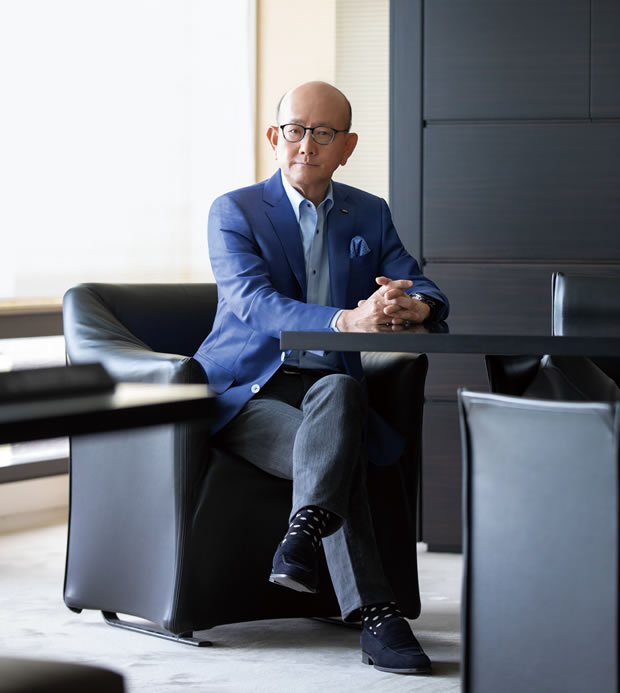
Sogo Shosha Facing Major, Unprecedented Threats
I feel a major sense of crisis in the fact that even now sogo shosha are fully immersed in the old economy. As market conditions change, technology progresses, and initiatives toward a carbon-free society go into effect, some resources may become essentially valueless.
In November 2017, I went to the United States to get a sense of the current state of business there. I came face to face with the global trend toward convergence of the Internet and the physical world, seeing how one major e-commerce company was working to gain a foothold in bricks-and-mortar stores by acquiring a supermarket. I saw how companies that had been founded only recently were combining the germ of an idea with IT technologies to grow into huge entities in a short time. Over the past decade, in the US and Chinese stock markets the top five companies by market capitalization have shifted; formerly dominated by smokestack industries, the top companies are now in the IT field. In that same period, however, the lineup in Japan has remained largely unchanged. Being in Japan, where regulations are slow to change, it is easy to have the illusion that the tectonic shifts taking place at breathtaking speed across the world in all manner of industrial fields—some of the biggest changes since the Industrial Revolution—are limited to certain countries and specific fields. However, turning our eyes away from the outside world as Japan did during its isolationist era could be dangerous for the country as a whole.
Looking back, sogo shosha have faced many difficult, “wintry” periods. By investing in the upstream and downstream areas of product distribution and gaining more sophisticated functions, the industry has been able to overcome the “disintermediation” that was once perceived as a serious threat. However, the threat the industry faces from the “Fourth Industrial Revolution” has an altogether different aspect. To date, general trading companies have relied on their contacts with companies in smokestack industries, but the influence of these companies is waning, and sogo shosha currently have only limited contact with the companies that are leading the current revolution. Furthermore, these new companies have business models that distribute goods in a variety of ways that do not require the intermediate distribution function that has historically been a core skillset for sogo shosha. Large sogo shosha are all reporting favorable earnings; in FYE 2018 combined profits came to around ¥2 trillion. That being said, I believe expansion along the same vector is limited. I think sogo shosha will face the limitations of their current business models in the not-too-distant future.
Companies will crumble away once people and companies alike become overoptimistic, thinking the future will be better. For this reason,
it is especially important not to become complacent, but to maintain a sense of crisis even when things seem to be at their best.
No Time to Be Complacent
The second sense of crises I feel is toward ITOCHU.
In FYE 2018, the final fiscal year of “Brand-new Deal 2017,” we met many goals. Consolidated net profit reached a historic high for the second consecutive year, and we achieved record high in gross trading profit, trading income, and equity in earnings of associates and joint ventures. By building an earnings base less affected by resource prices, we succeeded in one of our basic policies, “build solid earnings base to generate ¥400.0 billion level consolidated net profit.” By working together, the ITOCHU Group pursue the “earn, cut, prevent” principles, and we reached new heights in profits/losses of Group companies, the share of Group companies reporting profits, and profits from companies operating in the black, all of which contributed substantially to our record levels of consolidated net profit. By recognizing an impairment loss to reduce future risks, we ranked third in consolidated net profit, but core profit, which excludes one-time profits and losses, exceeded ¥400.0 billion for the first time. These results show how we have steadily reinforced our earning power. We had committed to generating core free cash flows of “over ¥100.0 billion +α;” the actual figure was ¥175.0 billion. Also, net debt-to-shareholders’ equity ratio (NET DER) reached the lowest level to date, at 0.87 times. These results demonstrate that we have fully met our other basic policy, “strengthen our financial position.” As a result, we achieved another major objective—obtaining an A rating from Moody’s — a dearly held wish for around 20 years. (→CFO Interview)
As we continue our forward march, we will often face imminent crisis. Having gloried in the days of Japan’s bubble economy, we had to address a legacy of losses when the bubble burst. The existential crisis we faced at that time is still fresh in my mind. A newer memory is of how general trading companies benefited from high resource prices. After posting unprecedentedly favorable results, the global financial crisis occurred, bringing us to another crossroads. This cycle has repeated itself numerous times. Companies will crumble away once people and companies alike become overoptimistic, thinking the future will be better. For this reason, it is especially important not to become complacent, but to maintain a sense of crisis even when things seem to be at their best.
Create a Brighter Future Founded on Innovation ITOCHU: Infinite Missions: Innovation
I am always reluctant to give on-the-spot interviews at the New Year’s parties hosted by Japan’s three economic organizations. This is because I am not good at improvising serious discussion in front of large groups of people. Therefore, I put a good deal of effort into preparing answers beforehand as usual. This year, my talk emphasized “innovation” as a keyword for 2018.
At a voluntary early-morning study session in May 2018, a room with space for 400 people was packed full of employees. The theme was “leading-edge technology trends.” I have already expressed the sense of crisis I felt in a number of situations. Attendance at this session helped reassure me that ITOCHU Group employees share this sense of crisis, and even today our corporate culture of staying ahead and taking on challenges is alive and well.
We do not take a reactive approach to dealing with threats. I am confident that the ITOCHU Group will confront its new competitive environment, fueled more than ever by a fighting spirit. Our new medium-term management plan, “Brand-new Deal 2020,” prepares us to “create a bright future founded on innovation.” We will anticipate change and push forward vigorously with “reinvented business.”
We have pursued business in a broad range of industrial fields in the 160 years since our founding, and we have cultivated assets throughout this time. These assets include a variety of strengths, including technologies, know-how, and our customer base. As an example, FamilyMart Co., Ltd. has some 17,000 stores across Japan that are visited by around 15 million people each day. E-commerce is making inroads, but physical stores still account for more than 90% of personal consumption, so having a network of stores in good locations is a major strength, as it allows us to obtain purchasing information from valuable consumer contact points. YANASE & CO., LTD. enjoys strong customer loyalty from the wealthy customers who purchase its luxury cars. NIPPON ACCESS, INC. operates approximately 10,000 trucks from 550 locations around Japan, providing a nationwide low-temperature distribution network that is unrivaled in Japan. We see this network as a competitive advantage ,as we believe distribution is key to the fusion of the digital and physical worlds.
In the textile industry, conventional retailers such as department stores and general merchandise stores are hard-pressed, while e-commerce companies have built up extremely streamlined business models. For instance, START TODAY CO., LTD., which operates ZOZOTOWN, has grown into a company with market capitalization of more than ¥1 trillion. This example illustrates how companies can grow even in mature markets by changing the way they sell, taking their cue from shifts in how and where consumers make purchases.
The “reinvented businesses” do not involve large-scale investments in e-commerce and IT companies, and often we need not look to entirely new fields of business. By combining the tangible and intangible assets of our existing businesses with new technologies, we believe we can create business models updated for a new era—what we refer to as “reinvented business.” (→Toward "Reinvented Business")
All general trading companies are fumbling along as they attempt to make progress on their business models. We believe we are particularly well-positioned to take the lead in innovation because of our strength in the non-resource sector, specifically the consumer-related sector such as textiles and food.
We have to start by going against conventional wisdom and first taking action.
If we run into a problem, we pull back, regroup, and take another step forward.
This iterative approach generates innovation.
Issues on the Road to Reinvention
These days, I often find myself telling employees “Why not just give it a try If it doesn’t work out, you can try something different.” Our morning-focused working system was one such approach. Reinvention requires us to revise our approaches to business. We have to start by going against conventional wisdom and first taking action. If we run into a problem, we pull back, regroup, and take another step forward. This iterative approach generates innovation. To ensure the ideas are not easily crushed, together with our corporate culture of “taking on challenges,” a culture of “taking on challenges again” will also come into its own.
One major pillar of this “reinvention” is FamilyMart UNY Holdings Co., Ltd. (→Our Business Model, as Seen through a Functional Example)![]() By introducing new technologies and services from the ITOCHU Group and its alliance partners, we will pursue reinvention, centered on FamilyMart UNY’s existing value chain. As part of this initiative, we will pursue optimization, involving NIPPON ACCESS, in logistics; ITOCHU Techno-Solutions Corporation to help enhance operating efficiencies; POCKET CARD CO., LTD., which provides financial service functionality; as well as further alliances with various other operating companies. In April 2018, we announced our decision to increase our stake, making FamilyMart UNY Holdings a subsidiary through a tender offer. This acquisition has several aims, including protecting from potential acquirers that aim to benefit from the substantial value of the company’s physical stores. Our foremost objective for making it a subsidiary, however, was to reinforce and transfigure its value chains led by us. As for FamilyMart, through our existing alliances with strong partners, particularly in China and other parts of Asia, we intend to work with these partners to promote business development overseas.
By introducing new technologies and services from the ITOCHU Group and its alliance partners, we will pursue reinvention, centered on FamilyMart UNY’s existing value chain. As part of this initiative, we will pursue optimization, involving NIPPON ACCESS, in logistics; ITOCHU Techno-Solutions Corporation to help enhance operating efficiencies; POCKET CARD CO., LTD., which provides financial service functionality; as well as further alliances with various other operating companies. In April 2018, we announced our decision to increase our stake, making FamilyMart UNY Holdings a subsidiary through a tender offer. This acquisition has several aims, including protecting from potential acquirers that aim to benefit from the substantial value of the company’s physical stores. Our foremost objective for making it a subsidiary, however, was to reinforce and transfigure its value chains led by us. As for FamilyMart, through our existing alliances with strong partners, particularly in China and other parts of Asia, we intend to work with these partners to promote business development overseas.
E-commerce companies are “professionals at selling” by leveraging IT. Taken to the extreme, they require no “product professionals.” ITOCHU, meanwhile, has seven Division Companies that have face-to-face contacts with different industries. For example, the Food Company is segmented into specialized fields that deal with specific product types, such as coffee, tuna, and bananas, which is an issue when creating a cross-industry framework. As a first step, under the direction of the Chief Strategy Officer (CSO), we have created a new cross-sector organization, and we will leverage the technologies of our Division Companies to support alliances among operating companies, partners, and venture companies. We plan to continue addressing this issue, as silo-like organizations tend to be an impediment to cross-company initiatives.
As part of the reinvention process, we will require cooperation with e-commerce and IT companies, as well as companies from other industries. We will consider collaboration with a wide range of partners, closely examining cooperation to ensure that such relationships are sufficiently beneficial to ITOCHU in terms of augmenting corporate value, as well as to its partners.
Balancing New Blood with Management Continuity
I often look back on my working life and consider whether this is the best path for my life to take. I also want to spend more time with my family as I grow old. Remaining the president of a sogo shosha that operates across a broad range of fields is quite difficult. By forming a capital and business alliance with Don Quijote Holdings Co., Ltd. and FamilyMart UNY Holdings we will be able to address one concern we had been facing, namely the benefits of the general merchandise store business. Also, I recognize that my being in office for eight years is exceptional for ITOCHU, and if I were to continue in my role as president, the impact when I retire would be greater. I thought it was time to change the management team to prepare for the next generation of the Company, as well as to change the awareness among employees. For this reason, I communicated to the Company’s Nomination Committee that I would not be continuing in my role.
Some issues remain, such as generating synergies from our alliances with the CITIC Group and the CP Group. We need to maintain our relationships with the groups’ top management, but my understanding is that in China, position within the company is of particular importance, rather than the individual. Also, to further strengthen management throughout the ITOCHU Group, we need to control the numerous presidents of the ITOCHU Group companies of my generation who have extensive experience. The Nomination Committee strongly requested that I continue. The committee’s argument was the Company required a combination of management continuity and “new blood,” in order to move the business model forward. After much deliberation, we came to a solution. I proposed a new management structure in which I would become the Company’s first Chairman and Chief Executive Officer (CEO), retaining the CEO title, while Yoshihisa Suzuki, President of the ICT & Financial Business Company, would be appointed President and Chief Operating Officer (COO). After meeting with Mr. Suzuki a number of times, the Nomination Committee approved the idea. For the foreseeable future, therefore, I will formulate management strategy for the overall ITOCHU Group and be in charge of the strategies of key operating companies and of maintaining relationships with important business partners. Meanwhile, the President and COO will oversee overall execution at ITOCHU, take charge of anticipating global trends, and consider and promote new “earning” businesses. I think this approach will enable us to maintain a good flow while steadily cultivating the next generation (→Next-Generation Management Structure)
Mr. Suzuki, who has a technical background, is interested in and well versed in new technologies. He has had a spectacularly successful career, becoming an executive officer in his 40s. At the same time, he experienced the global financial crisis during a post as President of a US subsidiary, and understands firsthand that taking on challenges does not always lead to success. Not losing heart, at the young age of 55 he became President of JAMCO Corporation, a manufacturer of aircraft interiors, helping the company rebound following the damage it suffered in the Great East Japan Earthquake and shepherding it to a listing on the First Section of the Tokyo Stock Exchange. Having experienced both success and frustration, I think he is an excellent choice for taking on new challenges.
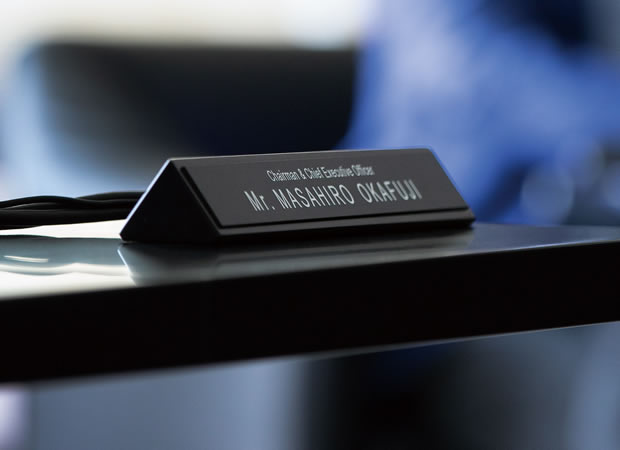
Making Sure Employees Feel They Have Found Their True Home
I am a firm believer in the idea that with people, what lies inside is the important part, rather than what you see on the outside. That being said, I think that conducting coordination, which requires employees to think of all sorts of things, enhances the flexibility of their imagination. On the day we presented our operating results for FYE 2018, I was wearing a lilac jacket and denim, because that was the first day of “dress-down+,” which we had introduced in May. We introduced this policy in the belief that providing a constant stimulus was important training in creativity, which would be required in the business of the future. As I have always said, our human resources policies are positioned as part of our management strategy.
On a non-consolidated basis, we have fewer employees than any other large sogo shosha. To compete, we need to have better labor productivity. Also, with labor shortages becoming the norm, securing superior human resources is difficult. We have taken the lead in introducing work-style reforms, such as our morning-focused working system. As a result of our forward-looking efforts in this regard, we have been selected as a Health & Productivity Stock by the Ministry of Economy, Trade and Industry and the Tokyo Stock Exchange. We have also won a number of awards from the Ministry of Health, Labour and Welfare. In numerous rankings of places of employment, we have scored top among sogo shosha, and we are a favorite among students, too. We take care not to unilaterally impose reforms on employees. Rather, management aims to ensure an employee focus, which I believe is the reason our programs have taken root. For instance, under our morning-focused working system we provide employees with breakfast and pay an overtime allowance for hours worked in the morning.
Under “Brand-new Deal 2020,” we place human resource strategies such as “smart management” and “No. 1 health management company” alongside “reinvented business” as strategic pillars, and we aim to lead the industry in labor productivity (→Reinvented Sampo Yoshi)![]() I have a special place in my heart for this strategy, which we explain in line with our basic policies as “ensure employees feel motivated and rewarded in their work and become the best company for employees’ families as well.”
I have a special place in my heart for this strategy, which we explain in line with our basic policies as “ensure employees feel motivated and rewarded in their work and become the best company for employees’ families as well.”
In spring of 2017, an employee died of cancer. Prior to his death, he saw an article in which ITOCHU had ranked second overall in a magazine’s ranking of “companies where employees are happy.” After reading the article, he sent me a message indicating his gratitude for the Company’s support, saying “For me, ITOCHU is the best company in Japan.” Reading his words, I made a vow. I was convinced that we could bring significant energy to bear in ensuring a true home for our people, whether healthy or struggling with illness. Based on this conviction and in the belief that people fighting illness were “family members,” I vowed that ITOCHU would support employees with serious illnesses both physically and emotionally. This background is behind our introduction of “Support Measures for Balancing Cancer Care and Work.” (→Support Measures for Balancing Cancer Care and Work)![]()
The number of employees who are working hard while at the same time fighting cancer and other serious diseases is not insignificant. I find it encouraging to see many people who have returned to work after a battle with illness and gone on to achieve remarkable results. We are indeed a company where people who work hard can take on new challenges.
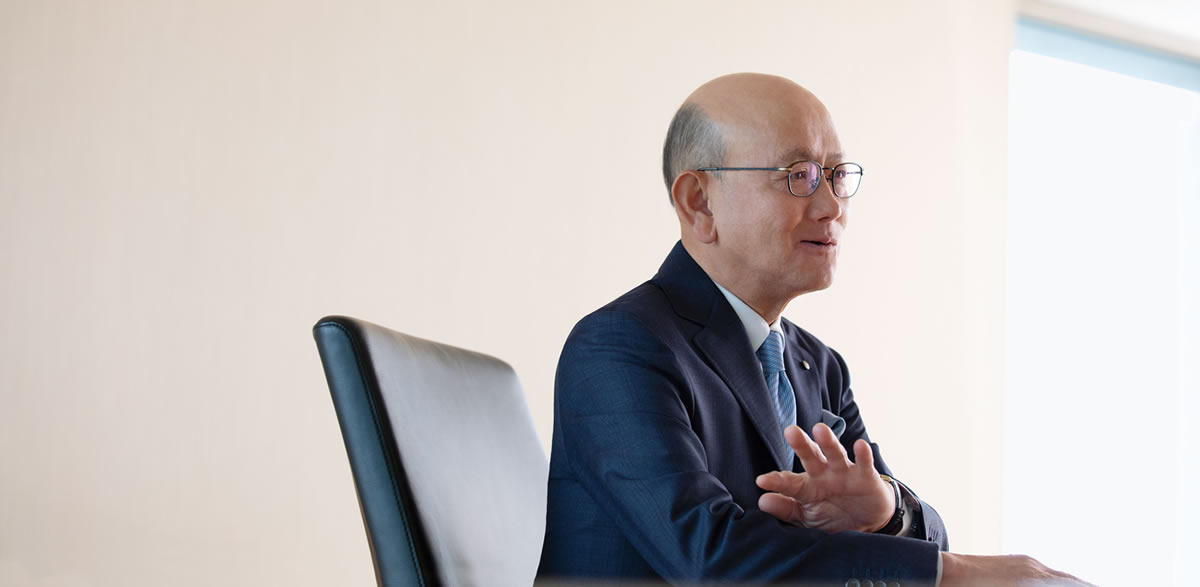
Learning through Reflection
It is my character to be prudent—some would even call me a worrier. It is my practice to take a step, stop and reflect, and then move forward again. When announcing our results for FYE 2018 and the briefing session for the new medium-term management plan, I once again learned a lesson in self-reflection.
I consider enhancing corporate value to be my topmost responsibility. I do my best to manage the Company by aligning myself with the perspectives of shareholders and investors. I am fully aware that a company’s stock price can be considered as a manager’s scorecard. General trading companies’ stock prices have tended to be low in relation to profit levels. In my understanding, one reason is the volatility of operating performance caused by resource prices. Since the start of our plan, my overriding priorities have been to build an earnings base that can generate stable profit independently of resource prices and to earn the trust of shareholders and investors. Also, from the very beginning I have been firmly committed to reaching the plan’s numerical targets that have been announced. Each year, we paid historically high levels of annual dividends. In FYE 2018, we paid dividends of ¥70 per share, ¥6 higher than the ¥64 dictated by our dividend formula. These dividends were 3.9 times the level we paid in FYE 2011 and the highest rate of increase for a sogo shosha. Assuming we deliver consolidated net profit of ¥450.0 billion in FYE 2019, which would be a record high for the third consecutive year, we plan to raise dividends again, by ¥4 per share, to ¥74 (minimum).
Looking at the one-year period from April 2017, other general trading companies revised their performance outlooks upward several times, due to rising resource prices. Even so, we recorded the highest percentage growth in our share price. Also, our share price has risen each year since April 2010, in contrast with other sogo shosha. I believe this rise in share price attests to the evaluation of our management by shareholders and investors.
Our share price fell sharply the day after we announced “Brand-new Deal 2020,” our new medium-term management plan, which coincided with our earnings presentation in May 2018. The drop seemed to come from a misunderstanding that we were diverging from our previous stance of “turning words into accomplishments.” This misunderstanding stemmed from the facts that first, we had left our conventional dividend formula unchanged, and second, differently from our previous medium-term management plan, the new plan provided qualitative rather than quantitative targets for consolidated net profit and minimum per-share dividends from the second year onward. In addition, our new medium-term plan was perceived as abstract and difficult to understand.
In a time when changes in the management environment are accelerating, accurately judging the situation three years into the future is difficult. That said, as in the past we had set a quantitative single-year target, based on the belief that regardless of conditions corporate management needed to be able to ascertain the situation one year hence and meet the goals it had committed to. Bearing in mind the ITOCHU Group’s consistent growth and increases in corporate value, we aim to achieve steady increases in operating performance from the second year onward. To do so, we aim to turn our words into accomplishments with a focus on further enhancing our existing businesses. Along with this short-term perspective, we have positioned the three years of “Brand-new Deal 2020” as a period for turning new businesses into reality and accumulating know-how. In this manner, we will pursue business from a medium- to long-term perspective. I believe we need to ensure that our current foundation is solid and take a deep breath before making a major leap forward.
Given this background, I recognize that I was somewhat over-cautious, and that I did not respond fully to the market’s expectations. Learning from this experience, I plan to do a better job of staying in tune with the market.
The Key to Achieving Sustainable and Long-Term Increases in Corporate Value
From a longer-term perspective, we plan to significantly cultivate our strategic business alliance and capital participation with the CITIC Group and the CP Group in the interest of achieving sustainable increases in our corporate value. We will keep putting every effort into this initiative even under “Brand-new Deal 2020.”
I am aware that progress on synergy investment projects has been slower than planned, due to such factors as the impact of China’s anti-corruption campaign. As a result, the scale and speed of our efforts to generate synergies have been below our initial expectations. The National Congress of the Communist Party of China outlined its policy of strengthening state-owned enterprises, improving the environment for promoting cooperation, and we are moving forward with discussions on cooperative business with the two groups. One attractive possibility is to cooperate on the convenience store business in China. In addition, even more than in the United States, China is leading the charge in leading-edge businesses such as mobile payments, drones, and electric and plug-in hybrid vehicles. By leveraging networks in China, including those of the CITIC Group and the CP Group, we are also looking to participate in businesses that are pursuing technological innovation ahead of Japan. Through the culmination of individual measures such as these, we expect to increase the corporate value of the CITIC Group and the CP Group, as well as their sluggish share price.
To spearhead efforts to build a foundation for expanding business in China over the medium to long term, in FYE 2016 we launched a project to increase our number of Chinese-speaking employees from around 300 to 1,000. We had met that goal as of March 31, 2018. This 1,000-strong corps accounts for around one-third of ITOCHU’s employees in career-track positions, and is of an unprecedented scale among Japanese companies. To celebrate meeting this goal, in April 2018 we held the ITOCHU China 1,000-Talents Gathering. This celebration was marked by the attendance of Mr. Cheng Yonghua, the Chinese Ambassador to Japan; Mr. Yang Xiaoping, Vice Chairman of the CP Group; and Mr. Pu Jian, Vice President of CITIC Ltd. We understand that in the following days, the ambassador communicated our initiatives to the highest authorities in the Chinese Communist Party.
In addition to this strategic move from a long-term perspective, we recognize the need to continue responding to requests from global society and pursue initiatives to achieve long-term, sustainable increases in corporate value. Alongside our strategic moves, we remain committed to helping resolve the issues facing society through our core business. As such, under “Brand-new Deal 2020” we seek “sustainable growth through a reinvented sampo yoshi approach.” (→Sustainability)![]()
Getting Back to Basics, Moving Forward Again
I will never forget how, as I was opening my email one morning, tears sprang to my eyes as I read the message from the employee fighting cancer who I mentioned earlier. As a company, our mission is to increase profits. As a merchant, our responsibility for meeting the plan we set for each fiscal year goes without saying. Doing so can be difficult. At the same time, I believe an ideal company is one that employees and society at large think of as a “good company” and a place where employees can work with pride. Recently, I hear from many quarters the comment that “ITOCHU employees seem enthusiastic.” A strong sense exists that we are taking firm steps to become the sort of company we envision as ideal. But this is no time to indulge in deep emotion.
Looking back at the words in the policy speech I wrote when my appointment had been confirmed stokes the emotion for me all over again. Being resolved to “getting back to basics,” every day the ITOCHU Group is making strides to become a next-generation merchant.
I would like to reemphasize that our true value as a company lies in having a culture of taking on challenges no matter how daunting.
I would like to reemphasize that our true value as a company lies in having a culture of taking on challenges no matter how daunting.
